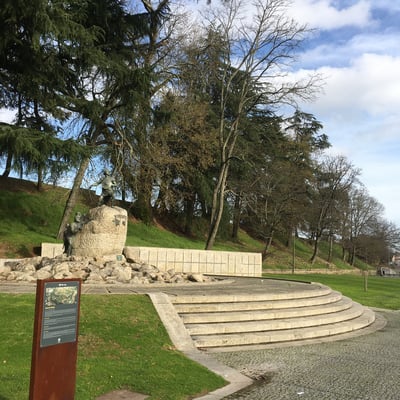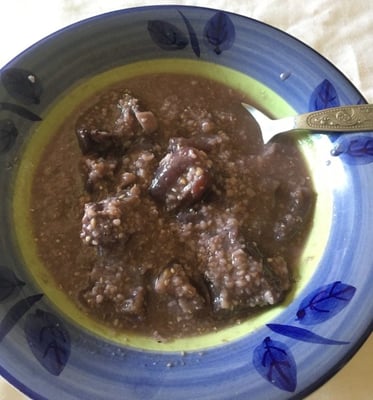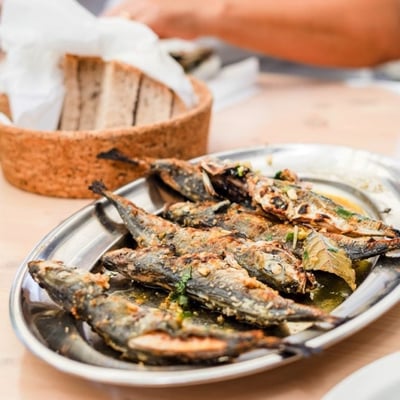1
00:00:03,413 –> 00:00:12,784
Amália da Piedade Rebordão Rodrigues nasceu em Lisboa, em 1920.
{{Amália da Piedade Rebordão Rodrigues was born in Lisbon in 1920.}}
2
00:00:12,784 –> 00:00:20,125
Veio a tornar-se a voz incontornável de Portugal, a Rainha do Fado.
{{She has become the undeniable voice of Portugal, the Queen of Fado.}}
3
00:00:20,125 –> 00:00:25,322
Amália cresceu com os seus avós maternos em Lisboa,
{{Amalia grew up with her maternal grandparents in Lisbon,}}
4
00:00:25,322 –> 00:00:33,799
e era para eles e para os vizinhos que cantava, até que, em 1935,
{{and it was for them and the neighbours that she sang, until, in 1935,}}
5
00:00:33,799 –> 00:00:40,583
foi escolhida para cantar o ‘Fado Alcântara’ na Marcha Popular desse bairro,
{{she was chosen to sing ‘Fado Alcântara’ at the Popular March of that neighbourhood,}}
6
00:00:40,583 –> 00:00:43,601
nas festas dos Santos Populares.
{{at the Popular Saints festivals.}}
7
00:00:43,601 –> 00:00:48,107
A partir daí, começou a cantar noutras festas
{{From then on, she started singing at other festivals}}
8
00:00:48,107 –> 00:00:53,469
e rapidamente chamou a atenção da crítica nacional.
{{and quickly caught the attention of national critics.}}
9
00:00:53,469 –> 00:01:03,077
A Diva do Fado fez a sua estreia profissional no Retiro da Severa, em 1939.
{{The Diva of Fado made her professional debut at the Severa Retreat in 1939.}}
10
00:01:03,077 –> 00:01:07,367
Passou pelas casas de fado Solar da Alegria,
{{She passed through the fado houses Solar da Alegria,}}
11
00:01:07,367 –> 00:01:12,684
onde adotou pela primeira vez o nome artístico Amália Rodrigues,
{{where she first adopted the stage name Amália Rodrigues,}}
12
00:01:12,684 –> 00:01:14,992
e Café Mondego.
{{and Café Mondego.}}
13
00:01:14,992 –> 00:01:18,490
Devido à sua crescente popularidade,
{{Due to her growing popularity,}}
14
00:01:18,490 –> 00:01:21,242
tornou-se cabeça de cartaz,
{{she became a headliner,}}
15
00:01:21,242 –> 00:01:26,681
e o seu ‘cachet’ atingiu valores nunca pagos a um fadista
{{and her ‘cachet’ reached levels never paid to a fado singer}}
16
00:01:26,681 –> 00:01:30,126
quando começou a cantar no Café Luso.
{{when she started singing at Cafe Luso.}}
17
00:01:30,126 –> 00:01:36,916
Das casas de fado lisboetas às grandes salas de espetáculo internacionais
{{From Lisbon’s Fado Houses to Major International Showrooms}}
18
00:01:36,916 –> 00:01:39,042
foi um pequeno passo.
{{was a small step.}}
19
00:01:39,042 –> 00:01:42,060
No início da década de 50,
{{In the early ’50s,}}
20
00:01:42,060 –> 00:01:48,110
Amália iniciou as longas digressões que marcaram a sua carreira,
{{Amalia started the long tours that marked her career,}}
21
00:01:48,110 –> 00:01:54,984
levando o fado e a língua portuguesa aos quatro cantos do mundo.
{{taking Fado and the Portuguese language to the four corners of the world.}}
22
00:01:54,984 –> 00:02:02,168
O seu percurso artístico passou, também, pelo teatro e pelo cinema.
{{Her artistic career (“path”) also passed through the theatre and cinema.}}
23
00:02:02,168 –> 00:02:06,124
Amália cantou poemas de autores consagrados
{{Amalia sang poems by renowned authors}}
24
00:02:06,124 –> 00:02:12,090
e teve os melhores letristas contemporâneos a escrever para si,
{{and had the best contemporary lyricists writing for her,}}
25
00:02:12,090 –> 00:02:18,934
mas alguns dos seus fados mais celebrados foram escritos por si mesma.
{{but some of her most celebrated fados were written by herself.}}
26
00:02:18,934 –> 00:02:25,964
Faleceu, em casa, a 6 de Outubro de 1999.
{{She died at home on the 6th of October, 1999.}}
27
00:02:25,964 –> 00:02:31,935
Portugal chorou a dor e saudade tão presentes nos seus fados.
{{Portugal cried the pain and longing so present in its fados.}}
 We respect your privacy and have a ZERO TOLERANCE for spam.
We respect your privacy and have a ZERO TOLERANCE for spam.
















Really interesting and concise mini-biography of one of the most celebrated artists. A note: gor an error after completing the quiz in app.
Glad you liked it! Thanks for letting us know about the error — I’m going to email you to get some more details. 😊
Hello,
quatro cantos do mundo means around the world? Thanks
Yes, exactly — it means “all over the world” basically. It’s a strange, old phrase, possibly originating from the Christian bible.
It literally means ‘the four corners of the world’ – an antiquated expression but quite widely used.
Hi, why is “levando o fado..” and not “a levar o fado”? why we use “ando”?
Thank you
Olá, Dayhana. Good question. ‘Levando’ is the present participle (gerúndio) of the verb levar. When we’re using the present continuous tense, we often replace this gerúndio by the preposition a + infinitive, as you suggested. For example, “is taking” (English present continuous) = está levando (Portuguese present continuous with gerúndio) = está a levar (alternative present continuous structure).
However, in this case, we don’t actually have the present continuous – note the absence of an auxiliary verb. So, directly replacing the gerúndio like that would not be grammatically correct. Our only options are to keep it, as we did here, or to use an alternative phrasing (e.g. “o que levou o fado…” = “which took fado…”) 🙂